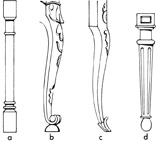Definition of: Louis
(l ′is, Fr. l
′is, Fr. l ·ē′)
·ē′)
A masculine personal name. Also spelled Lewis. [<Gmc., famed warrior]
—Louis I,
778–840, Holy Roman Emperor 814 –840; son and successor of Charlemagne: called “le Débonnaire.”
—Louis VIII,
1187–1226, king of France 1223–26.
—Louis IX,
1214–70; king of France 1226–70; defeated and captured by the Saracens at Mansûra 1249; canonized 1297 as Saint Louis.
—Louis XI,
1423–83, king of France 1461–1483; made the power of the throne paramount.
—Louis XIII,
1601–43, king of France 1610–1643; son of Henry IV.
—Louis XIV,
1638–1715, king of France 1643–1715; son of the preceding: called “Le Grand Monarque,” “le roi soleil.”
—Louis XV,
1710–74, king of France 1715–1774; great–grandson of the preceding; ceded Canada to Great Britain.
—Louis XVI,
1754–93, king of France 1774–1792; grandson of Louis XV; dethroned by the revolution and guillotined.
—Louis XVIII,
1755–1824, brother of Louis XVI; king of France April, 1814–March, 1815, and June, 1815–24.
—Louis Napoleon
See NAPOLEON III.
—Louis Philippe,
1773–1850, king of France 1830–48; abdicated: known as The Citizen King.

PERIOD STYLES ILLUSTRATED BY CHAIR LEGS
a. Louis XIII. b. Louis XIV. c. <Louis XV. d. Louis XVI.  ′ē) noun
′ē) noun 
 ′is,
′is, 
Comment about this word, ask questions, or add new information about this topic: